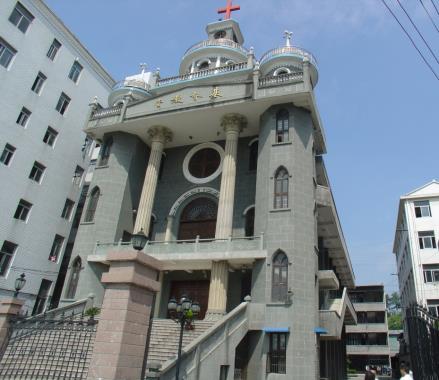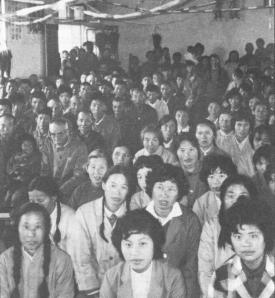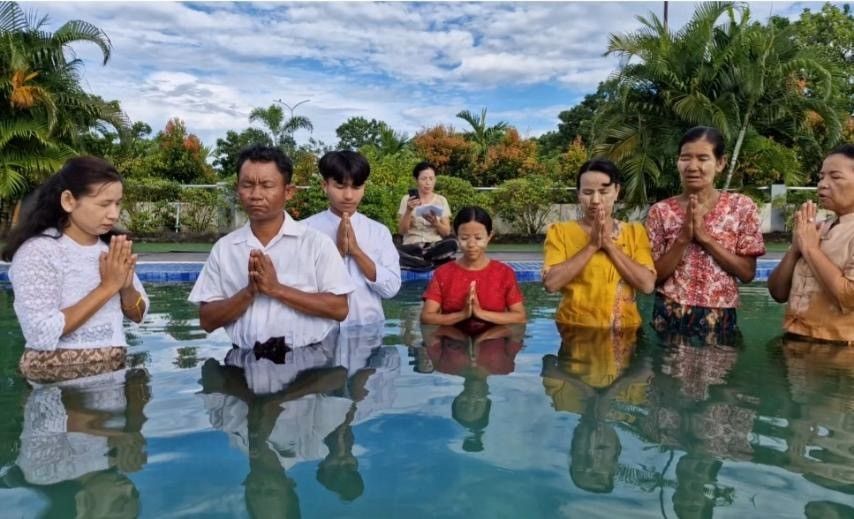The 'Registered House Churches' of Wenzhou

One of the hundreds of 'registered house churches' in Wenzhou today. [Pieter Kwant]
First-time Christian visitors to China today often expect to find a persecuted, underground body of believers who meet in caves, apartment blocks and other nondescript locations. Those who visit the coastal Zhejiang city of Wenzhou would be shocked by the overt and dominant Christianity on display there, with thousands of churches—dozens capable of holding in excess of 1,000 worshippers— dominating the landscape both in the city itself and in surrounding districts. Believers like to say there is "a church every kilometer" in Wenzhou.
Many overseas visitors have mistakenly assumed that the situation in Wenzhou is representative of all of China, when in fact the open churches there are a special arrangement not seen even in other parts of Zhejiang Province. How did this come about?
In the late 1970s and early 1980s the government-approved Three-Self Patriotic Movement grew in influence, and the authorities dictated that all Christian fellowships must register with them or face the consequences. The Wenzhou church leaders prayed fervently, seeking God's will, but pastors and their flocks seemed hopelessly divided. Some believed that to register with the government was akin to denying Christ, while on the other hand there were many genuine believers who feared that not registering as Three-Self churches would be disobeying the laws of the land and the civil authorities instituted by God. Many pastors did register with the TSPM, and hundreds of new church buildings sprang up throughout the region.
Wenzhou by this time had emerged as a powerhouse for Christianity, earning it the nickname, 'the Jerusalem of China.' Many children of faithful Christians had risen to positions of authority in the local government, and were not inclined to rigidly enforce the harsh edicts against the Church that were handed down from Beijing.
Wenzhou's economy had also emerged as a major force in China, with the city rivalling the combined economic output of the much larger Beijing and Shanghai. The new leaders of China in the 1980s were eager to develop the country's infrastructure to catch up on decades of lost progress under Mao, and they needed to curry the favor of Wenzhou business leaders, many of whom were dedicated followers of Christ.
This unique environment resulted in the praying Wenzhou church leaders reaching a unique arrangement. Instead of deciding which side to take in the registration question, they choose neither to close their fellowships nor to register with the government. All across Wenzhou, large house church buildings emerged, independent of the Three-Self, yet openly proclaiming the gospel. They came to be known as 'registered house churches'. With the possible exception of some tribal areas in southwest China, this arrangement is unique to Wenzhou.
It appears the Chinese government was certain that Christianity in Wenzhou would gradually fade into obscurity as the older generation of believers died. The atheist leaders of the nation saw no value in religion, and assumed the people of Wenzhou, being highly educated and economically prosperous, would abandon their faith. They were unable to comprehend that Christianity is not merely a set of man-made rules or human philosophies, but a personal relationship with a living Jesus Christ.
Communist hardliners who had arrogantly instituted the 'religion-free zone' of Wenzhou in the 1960s were confounded by the wisdom of God. The Church in Wenzhou continued to flourish, and became a highly visible sign of both the triumph of God's kingdom and the foolishness of those who attempt to destroy it.
Persecution in central Zhejiang

Hundreds of believers jammed into the Wuniu Three-Self church in the late 1980s.
New government religious policies were implemented throughout Zhejiang in the early 1980s. As a result, numerous new buildings were opened as places of worship, while many old churches that had been confiscated in the 1950s and 1960s were returned to the body of Christ. From the opening day, the churches were crowded with large numbers of spiritually thirsty people. Some were faithful believers who had persevered during the Cultural Revolution, and were delighted to be able once again to freely worship God. Other attendees were curious locals who wanted to see what Christianity was about.
Although many churches in Wenzhou were permitted to operate openly without registering with the TSPM, this unique arrangement didn't extend to other parts of Zhejiang, where the government severely persecuted house church believers who refused to join the Three-Self.
The majority of Evangelical churches throughout the province had declined to register, and their stand seemed justified when reports surfaced of the active participation of TSPM officials in the persecution of Christians.
Yiwu City at the time contained approximately 20,000 Christians, most of whom had agreed to register. A similar number of believers in nearby Dongyang, however, decided to remain independent, which enraged the local Three-Self leaders. They ordered more than 100 illegal house church fellowships in the county to disband and to attend Three-Self churches instead.
On February 28, 1982, Jin Bingfu, the deputy chairman of the Three-Self committee in Dongyang City, incited commune members and the militia to launch a sudden attack on a house church meeting during the Sunday morning service.
At first the attackers tried to intimidate the congregation, and when that failed they threw chalk dust into the air to blind the believers. They then used electric batons to torture the church members, and several women fainted after their bodies were jolted by the electric current. As they lay unconscious on the floor, their clothing was removed and they were left naked in a bid to humiliate them.
Finally, some of the believers were beaten and thrown into manure pits near the church. One brother, who refused to stop praying during the commotion, was bound, stripped naked, and hung upside down. He was beaten until he was black and blue all over, but still he persisted in prayer. Months later, one of the men who had been battered and thrown into a pit died from his injuries.
Thirty-one believers at Dongyang were arrested and locked up at the Public Security jail. When news of the shameful attack spread throughout the local community, both Christians and non-Christians marched on the police station and demanded the believers be released. The officials finally bowed to public pressure and let them return home. No action was taken against the leader of the Dongyang Three-Self church who had instigated the attack.
The persecution at Dongyang did not end there, however, and a short time later the house church leaders were again arrested and tortured. Meanwhile, a sizeable number of Christians who had registered in neighboring Yiwu were disgusted when they heard about the attacks on their brothers and sisters in Dongyang, and they stopped attending the registered church. This infuriated the Three-Self leaders at Yiwu, and they too began persecuting the believers in that city. 1
Although the persecution at Dongyang and Yiwu took place in one part of central Zhejiang, the repercussions for Christianity throughout the province were profound. Many believers dug their heels in and considered the offer to join the Three-Self Patriotic Movement a demonic ruse to destroy their churches. To this day, the majority of Christians in Dongyang and Yiwu continue to meet in unregistered meetings outside the control of the government, while in Xiaoshan County one report stated: "95 percent of the 63,000 Christians there belonged to the indigenous Little Flock group and are opposed to the TSPM, although showing every sign of being patriotic citizens in every other respect." 2
Doctor Jesus
The more the government tried to destroy the Church in Zhejiang, the more it multiplied, and during the 1980s numerous miracles occurred which displayed the matchless power and grace of Jesus Christ.
In one rural Zhejiang village a woman had suffered with a brain tumor for nine years. She had spent all of her money trying to fund a cure, but there was no improvement, and she resigned herself to death. One day, as she lay in bed,
"The woman saw three people in white robes come into her house. They entered her room and one of them asked, 'Do you want to be healed?'
A white-robed man came near her and stroked her head where the tumor was. She felt fluid leaking from her head, and a lump being removed. Then the man seemed to close up the opening with a few quick movements of his fingers. The village woman instantly felt relieved. She asked, 'What is your name, Doctor?' The white-robed man answered, 'Jesus. You can find me in the nearest town.' Then he disappeared." 3
That evening the woman's children returned home from work, and she shared how a doctor had visited and given her free treatment. They paid little attention, thinking she was delirious.
The woman grew stronger every day, and the tumor had simply vanished. After a while she felt strong enough and set out for the neighboring town to thank Doctor Jesus for healing her. That day, a Christian grandmother in the town was taking care of her grandson. He was restless, so she decided to take him for a walk to use some of his energy. As they walked out of their gate, the healed woman approached and asked where she could find the doctor named Jesus.
The grandmother took her to the local church, where the woman retold her story. The believers were not surprised, for miraculous healings were commonplace in those days. They told her who Jesus is and preached the gospel to her. She repented of her sins and returned home a new believer. Shortly after, "her whole family came to Christ. Her testimony quickly spread throughout her village, and many people wanted to believe in Jesus." 4
The Potato Thief
In Rui'an, south of Wenzhou, a Christian farmer had stacked his many potatoes outside his home, but someone kept stealing them, a few at a time. This brother decided he would stay up one night to see who the thief was. He concealed himself and waited all night. Finally the thief came, but before he took any potatoes he stopped and prayed out loud to heaven:
"O Spirit, please forgive me for coming again to steal these potatoes. I have come to the home of this Christian family because I know if they catch me they will not beat me, whereas if a non-Christian catches me they will beat me severely. Please forgive me, O heaven. You know that I have not come to take these potatoes for my own benefit, but that I need them to feed my starving family and newborn baby. Please forgive what I am about to do." 5
When the Christian farmer heard the man's prayer he was heart-stricken. Tears welled up in his eyes as he realized he had not been attentive to his neighbor's needs.
After the thief completed his mission and returned home, the brother went inside and woke his wife, explaining what had happened. She was also deeply touched and they fell to their knees and repented for their selfishness.
The Christian couple decided to visit the thief and his family and bless them. They made a basket of potatoes, sugar, flour, salt, and other items as a gift. When they knocked on the door of his house, however, the thief refused to open it because he thought they had come to seek retribution and beat him.
After some time waiting outside, the Christians called out to the neighbor, "We have not come to punish you, but to seek your forgiveness. We have some gifts for you. Please open the door!"
This deeply touched the thief and his wife and children. The next day they told many other people in the village, "We stole the Christian family's food, yet they came to us and asked forgiveness!" Their testimony made a great impact on many people. Revival broke out in that village and dozens of families gave their lives to Jesus.
Visitors from Henan
By the late 1980s, God's Spirit was being mightily poured out on the rural house church believers in provinces like Henan and Anhui. Millions of people turned to Christ, causing some of the leaders to visit Zhejiang to see how God was working there, and to seek ways in which their house church networks could cooperate.
Sister Ding Hei, a well-known house church leader and evangelist with the Fangcheng movement in Henan Province, recalled a visit she and her co-workers made to Zhejiang in 1989:
"Four of us traveled to Yueqing City, where a huge crowd gathered to hear us speak. We testified about what God was doing in other parts of the country, then we asked the sick to come forward for prayer and invited all believers to come and be filled with the Holy Spirit. At least 80 percent of the sick we prayed for raised their hands when asked if they had been healed. The blind saw and the lame walked. God did great things.
While one of us was speaking, a crippled 15-year-old girl was brought to the platform. She was deformed and was less than one meter (three and a half feet) tall. After the sermon the girl said she wanted to go to the toilet. People carried her there and waited for her to return, but when she came out she said something astonishing happened to her and she didn't need to be carried back! The Lord had healed her and she walked back to the meeting unaided. Furthermore, she had grown taller and was now a normal height!
Next we visited Yongjia County, where a woman was dying from four different types of cancer. Her daughter attended our meeting and many miracles occurred. Later that afternoon, the girl came to the house where we were staying and begged us to come to the hospital to pray for her mother.
We were in the midst of our meetings and were so busy that we couldn't go, but we wrote her mother's name on the palms of our hands and prayed for her. It was 3:15 p.m. when we prayed, and the girl said that her mother was completely healed of all cancer at 3:15 as she lay in her hospital bed. The very next day both the mother and daughter came to our meeting and testified to what God had done. They followed us to all of our meetings. Like hungry puppies they lapped up everything they could eat and drink from the Word of God." 6
Brother Yun, in his well-known biography The Heavenly Man, also visited Zhejiang in 1989 after his second long imprisonment for the gospel. Yun recalled:
"I was invited to lead special meetings in Wenzhou, and great miracles took place. The blind saw, the deaf heard, and the lame walked. People who desperately needed the Lord surrounded us. They even touched my clothes, hoping to receive healing from the Lord. Finally, it took six or seven strong coworkers to carry me away from the crowd and out of the meeting." 7
A Decisive Decade
As the 1980s drew to a close, believers in Zhejiang looked back in astonishment on a decisive decade in the history of Christianity in the province. Ten years earlier the Church had still been struggling to emerge from the Cultural Revolution, but tremendous growth throughout the 1980s and a dramatic shift in religious policy meant that many believers could now come out of the shadows, both in government-approved Three-Self churches and in the new 'registered house churches' of Wenzhou.
Christian estimates from Zhejiang throughout the 1980s provide a snapshot of the tremendous growth that had taken place. In 1984, an official source connected to the Three-Self Church gave the number of registered church members in the province as 700,000 believers in 1,200 churches. 8 The Three-Self, however, publishes notoriously conservative numbers that only take baptized adult church members into account.
Two years later, another Christian publication estimated a total of three million Evangelical believers in Zhejiang Province. 9
During the 1980s, church leaders in Zhejiang also started sending evangelists to other provinces. Before that time they had concentrated on the needs of their own people, but after the gospel had already spread to most parts of the province, they lifted up their eyes to needs further afield.
The Christians in northern Zhejiang were grieved to learn that a massive idol had been erected in a town across the border in neighboring Anhui Province. They flooded the town with evangelists, and their powerful preaching convinced many people to abandon their sins and false gods. Many pilgrims who traveled to view the idol threw their joss sticks on the ground and stomped on them.
The Communist Party appeared to view the upsurge of Christianity in Zhejiang with both bewilderment and anger. The more the nation's leaders had tried to suppress the Church the stronger it had grown, and they appeared to be at a total loss as to what to do next. An official report in 1988 noted that many Party members had resigned their affiliation and become Christians. In Pingyang County, "108 Party members believed in Christianity. About half had believed because they or family members had met with sickness or other disasters and no-one in the Party had bothered to care for them." 10
By the end of the 1980s it was apparent that not only had the Church in Zhejiang survived three decades of hardship and struggle, but thousands of flourishing churches had emerged, full of vibrant and joyful believers! In summarizing the revival in Zhejiang throughout the 1980s, veteran China missionary Leslie Lyall wrote:
"Hudson Taylor and his first party of pioneers settled in Hangzhou, the beautiful lakeside provincial capital. Officially there are 900,000 [registered] Christians in the province, meeting in 1,600 churches, but with only 300 pastors....
In Hangzhou alone there are three registered churches and 700 additional meeting points. The Drum Tower Church holds three services each Sunday attended by about 3,000 people. Two-thirds of the members have become Christians during or since the Cultural Revolution. Eighty baptisms on a day is not uncommon....
Wenzhou has become known as the 'Jerusalem' or 'Holy Land' of China. In one area of eight counties there are 330,000 Christians—in one village Christians are 80 percent of the population!" 11
Footnotes:
1. Accounts of the Dongyang and Yiwu persecutions were distributed throughout China and ultimately published overseas, including by Asian Report (July 1982).
2. Tony Lambert, The Resurrection of the Chinese Church (Wheaton, IL: Harold Shaw Publishers, 1994), p. 86.
3. "What is Your Name, Doctor?" Asian Report (January-February 1985).
4. "What is Your Name, Doctor?"
5. Peter Xu Yongze, personal communication, October 2003.
6. Ding Hei, personal communication, March 2001.
7. Brother Yun with Paul Hattaway, The Heavenly Man: The Remarkable True Story of Chinese Christian Brother Yun (London: Monarch, 2002), p. 193.
8. Bridge (March-April 1984).
9. Pray for China (January-February 1986). Lambert, The Resurrection of the Chinese Church, p. 143, estimated a total of 2.5 million Evangelical believers in Zhejiang at the time.
10. Tony Lambert, China's Christian Millions: The Costly Revival (London: Monarch, 1999), p. 142.
11. Lyall, The Phoenix Rises, pp. 133-4.

© This article is an extract from Paul Hattaway's book 'Zhejiang: The Jerusalem of China'. You can order this or any of The China Chronicles books and e-books from our online bookstore.




